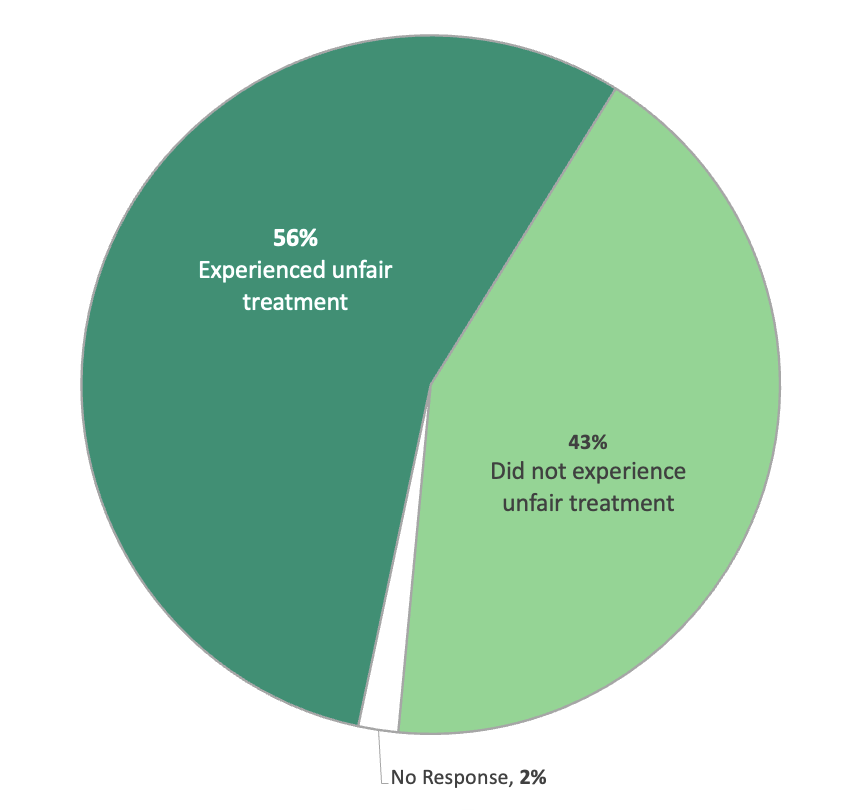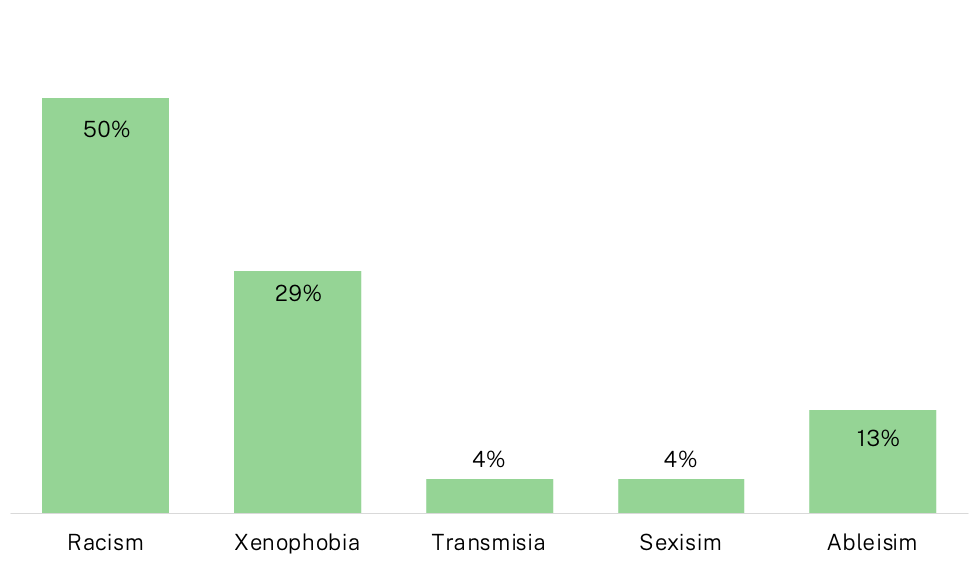“I Am Transgender, So It’s Obvious Why They Didn’t Want to Attend to Me”: Discriminatory Experiences of Immigrant New Yorkers During Medicaid Renewal
Enrolling in or renewing one’s Medicaid can be a difficult and time-consuming process for anyone. However, it can be especially challenging for immigrants who may experience various difficulties from language access issues to technology difficulties. To help with the enrollment process and to mitigate the challenges, immigrants often turn to others, including family members, community-based organizations and Medicaid staff for help with the renewal and enrollment process. In our research, IRI has found that immigrant New Yorkers are often met with discriminatory experiences from Medicaid staff, the very people specifically tasked with helping the community enroll and renew for Medicaid. As we seek to understand the experiences of immigrants who have renewed their Medicaid during the unwinding period, we have found that the unfair treatment by the first point of contact within the Medicaid agency is a common experience for many.
Our survey revealed that over half of immigrant New Yorkers (56 percent), who responded to our survey say they experienced some form of discrimination while interacting with Medicaid staff.
Over Half of Survey Respondents Expressed That They Experienced Unfair Treatment When Interacting with Medicaid Personnel

Fig 1. Immigration Research Initiative Survey. Based on 54 responses.
Treating everyone equally should not depend on a person’s race, country of origin, gender, or physical ability. The discriminatory experiences this survey uncovers are in line with what other studies have found. A 2022 study by the Urban Institute, for example, finds that patients face discrimination after being enrolled in Medicaid. Our survey reveals, further, that for many immigrants, their entire experience is likely to be riddled in unfair treatment from the very beginning.
Immigrants Enrolling in Medicaid Face Various Types of Discrimination
Amnesty International defines discrimination as when a person is unable to enjoy, “human rights or other legal rights on an equal basis with others because of an unjustified distinction made in policy, law or treatment.” What the stories shared throughout these interviews and survey responses show is that most immigrants who are renewing or enrolling in Medicaid have, in the process, experienced some form of discrimination. Of the respondents who shared that they were treated unfairly, there were instances of racism, anti-immigrant bias, transmisia (anti-trans bigotry), sexism, and ableism that tarnished their experiences.
Types of Discrimination Experienced by Survey Respondents
 Fig 2. Immigration Research Initiative Survey
Fig 2. Immigration Research Initiative Survey
Racism
Of those who experienced being treated unfairly by Medicaid staff, half experienced racism.
Some interviewees were reluctant to attribute the way they were treated to discrimination, yet when they went into detail it became clear that they had experienced discrimination. In response to an interview question asking if they experienced discrimination at any point in their process renewing one person shared: “No, I felt a, a little bit disrespected because of my color and I had to get over it since I needed that insurance coverage for my medication.” In other words, they said they had not experienced racism, and then went on to describe racist treatment.
When asked about the hardest part of the enrollment process another survey respondent noted the explicit discrimination that was apparent from Medicaid personnel and stated that “Racial profiling from the officials” was the hardest part of the renewal process.
While some respondents were hesitant to call their mistreatment racism, others were clear about their experience. When asked why they think they were treated unfairly many survey respondents attributed their treatment to racism. Others elaborated and shared their personal stories writing, “A navigator wouldn’t come close to me because of my skin color.” Another survey respondent similarly linked their unfair treatment to their skin color: “I think I was delayed a bit longer and not getting clear responses because of my skin color.”
Other respondents also shared that they were treated unfairly due to racism and noted that they believe their unfair treatment was “because of my racialized identity” and “because of my ethnic background.” When asked what one thing about their experience they would change, a survey respondent wrote that they would change the “...unfair treatment of colored individuals.” Immigrants of all races come to this country and when they encounter the Medicaid staff they should expect to be treated fairly, regardless of the color of their skin.
In an interview a participant shared that their intersectional identity, as a Black individual with a disability, was targeted when they sought assistance by going to the Medicaid office: “I’m physically impaired, so I needed assistance by them [Medicaid staff]. So, getting into one [a Medicaid office] was a bit difficult, but at the end I did get to another one. Another challenge which I faced about is racism. I think the one who was asked to assist me was a bit like a racist, I can say that because the assistance which she was providing to other, the whites and I being a Black, differed. So, I think that racism was one of the main challenges which I faced.”
Ableism
In our survey of immigrants who experienced unfair treatment by the Medicaid staff four percent shared that they had faced ableism. When survey respondents were asked about why they thought they were treated unfairly one person shared attributed it to “my crippled state.” These stories highlight the challenging experiences that people with disabilities, immigrants and U.S.-born alike, have when visiting the Medicaid offices. In response to why they received unfair treatment one survey participant shared the following reflection: “I think it was because of my mental disability.” It is crucial that Medicaid staff are prepared to deliver professional service to all people regardless of their physical or mental abilities.
Anti-Immigrant Bias
In this survey of immigrants, 29 percent mentioned experiencing unfair treatment that was related to being an immigrant. New York has a long experience with immigration from around the world, and yet, even here, people are experiencing anti-immigrant bigotry as they enroll or renew their health insurance coverage. In response to our survey question to tell us more about why they felt that they were being discriminated against we received the following responses which highlight the anti-immigrant attitude of some Medicaid staff. In describing how they were not treated fairly multiple, survey respondents attributed it to their immigrant identity: “Well, it feels like it’s because I was an immigrant.” Another respondent shared, “I think it was because I was a refugee and wasn’t a first class citizen and I didn’t have someone to guide and properly educate me on how to go about it…I had made some mistakes that cost me a lot,” highlighting the bias that they experienced because of their immigration status.
Many respondents shared experiences of encountering Medicaid staff that explicitly showed anti-immigrant attitudes and bias. One respondent revealed, “The challenging part was when I disclosed my status to the officers that I’m an immigrant. I was treated completely different from other persons. I wasn’t given quality attention and authentic information about how to go about the renewal process and I had to keep pressuring to get attention and it was so time consuming.”
In an interview, one participant recalled when he was treated unfairly because of his identity as an African immigrant, “Yeah, I think I was treated differently because I wasn’t given enough time probably. Also since I was a first timer by then, and from a racially different background, and from a crisis country of origin…I can remember one of the, one of the enrollers during my first time treated me a bit different because like, she was wondering why I’d called several times because to some point she was rude to me.”
When reflecting on the unfair treatment that they experienced, many survey respondents attributed treatment to a “language barrier.” This was a very common struggle that was shared by the immigrants who we interviewed and surveyed. Another respondent said, “Maybe because they found it hard to understand me sometimes.” New York is one of the most linguistically diverse places in the world, so it is troubling that immigrants are facing language barrier issues in this state. One respondent shared that they were treated unfairly when an “officer pretended not to understand due to my accent.” Anti-immigrant bias should not prevent someone from getting the support that they deserve. Some immigrants surveyed shared that they were treated unfairly and had a difficult time, “because of my accent” and “language tone barriers,” highlighting how immigrants are often treated when going through the steps of enrolling in Medicaid.
Transmisia
The suffix “-phobia” is used to describe fear, not hatred. From the interviews conducted in this research, we have learned to challenge the use of words like transphobia to describe behaviors and actions not motivated by fear, but by hatred. Instead, we utilize here the suffix “-misia” which means hatred. The word transmisia describes the “prejudice at the root of beliefs, attitudes, behaviors, and systems that hurt or deny the existence of trans and nonbinary people.”
In this study, we spoke with immigrants who experienced discrimination based on their identity as transgender, nonbinary, or gender nonconforming. Of respondents that experienced discrimination, 4 percent experienced transmisia. One respondent described their discriminatory experience in detail: “The Medicaid staff didn’t really want to engage with me. They would just kind of give me straight to the point answers. And it was just very brief. And so that was just it, I think. Because his reaction, like he didn’t really like to look at my face or just looked at me and in disgust.” Another respondent directly attributed their unfair treatment to transmisia:“I am transgender, so it’s obvious why they didn’t want to attend to me.”
Unprofessional Medicaid Staff
From the survey responses to the interviews that we conducted, a common theme that came out of this research was the unfair treatment by Medicaid staff. When asked if you could change one thing about the renewal/redetermination process to make it easier for others, one respondent replied, “rude staff and the wait time.” While wait time is a structural issue that individual staff members may not be able to fix, Medicaid enrolment should not involve rude or unprofessional treatment. When asked about the hardest aspects of the renewal process, survey respondents noted that working with the Medicaid staff was the most difficult: “The uncooperative attitude of the Medicaid staff.”
Some of the interviewees that did not report experiencing any unfair treatment highlighted the fact that most of their interactions with Medicaid were either online or over the phone. One person who did not experience any unfair treatment from Medicaid staff shared the following story, “I did not feel any sort of disrespect whatsoever. Yeah. I did not feel any sort of discrimination. It was just a normal phone call. Although I wouldn’t say I was, like, respected to the maximum level, but I did not feel, get any sort of disrespect.” Perhaps physical distance protected this person from experiencing the discriminatory treatment that the majority of our respondents experienced.